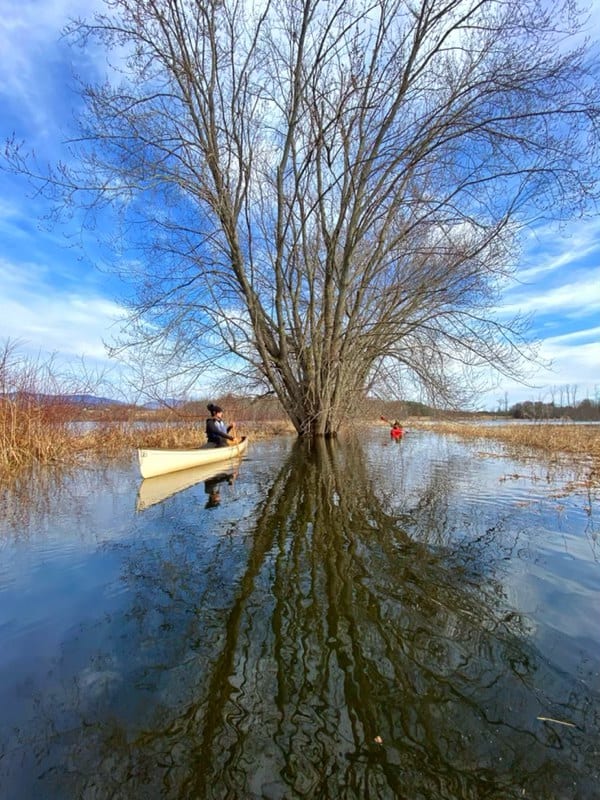
Timing is everything when you seek to paddle across flooded fields, else you’ll miss the rare opportunity. Merisa Sherman and friends timed it perfectly this past week.
By Merisa Sherman
For a few days every spring, there comes a magical moment for paddlers in Vermont. A section of the Otter Creek swells over the road and fills in a dairy farm pasture. The fields and some forests fill with a few feet of water, making this a paddler’s dream adventure. For years, I had seen photographs of this magical place and imagined how this experience would be. In-between work and skiing, we always seem to forget to check the gauge levels until it’s way too late and we are stuck looking at the photos of others instead.
We almost didn’t make it this year. About half way to our destination, we realized that a life jacket hadn’t quite made it into the car. This creates quite a problem for several reasons: 1) life jackets are one of those pandemic popular items that aren’t expected to be back in stock online until sometime in August 2021; and 2) because Vermont is a small-town, rural state we would be fooling ourselves if we thought that a sports store would be open on a random Monday in April. We visited four stores in person and called three others, finally having random success at a general hardware store. It was on!
The launch site was only 100 yards from the flooded road and is oftentimes itself under water. But we had timed it perfectly. The culvert drain was spinning enough for a merry-go-round, but that would have to wait for the return trip because we had a flooded forest to paddle!
After a short river-like section past a wetlands reserve (and way too close to a beaver house), we were there. I had to pause my canoe and simply stare, absorbing the moment but also trying to figure out how I was going to get my 14-foot canoe through the obstacle course that lay before me. The wind and the beaver had done some pretty good work at the entrance, and we laughed as we maneuvered through this initial section.
There was a brief sense of disappointment, too, as the amount of debris contrasted with the open forest of my dreams. Obviously, this wasn’t going to be like the ancient banyon trees of the Louisiana bayou, but I had been expecting more than a beaver’s lumber yard. As I looked farther out, across the flooded field, the reality began to sink in. We were only at the beginning. This section was merely the first of several that we would paddle through that day and I refocused my attitude toward gratefulness.
Here I was, checking off one of my bucket list items without ever leaving the great state of Vermont, paddling a flooded forest with some of my favorite paddle buddies on a beautiful spring day.
We were living my dream. If you looked up to the blue sky, you couldn’t tell if you were exploring on skis through the woods in early spring or hiking across the green mountains in November. The familiar hardwoods were all around us, some with trunks larger than a human being while others were younger than us. But there was no powder to float through or leaves to crunch under foot, just the sound of a paddle rippling through the water as we glided along through the flooded forest.
As my canoe glided across the water, it began to feel more and more like skiing powder through the trees. Creating my own path through the woods, I ducked under branches to avoid getting whipped in the face and avoided fallen logs that could scratch my bases, I mean the bottom of my canoe. There were nooks and crannies to fit through and fallen logs to change course for — instead of tree skiing, we were tree paddling! Some parts were so tight that you had to slow down to almost a standstill, put your paddle down and use the trees to pull you through. Just like getting stuck skiing in the trees.
We explored for hours and wanted more. There was no up or down of a mountain to mark the passage of time, nor a designated trail to preserve the land around us. Forward, backward, sideways, around this tree and then back around this one. We were free to explore, to choose our own path, to simply meander. We paddled down a flooded road and along a snowmobile trail. We heard the noisy bird chirps of spring and saw a beaver collecting sticks for his home. A muskrat was mistaken for a bird nest, a ball of fluff hanging precariously from the branches of a flooded bush. An osprey flew overhead and a large tree slowly cracked as it collapsed into the water. We were in a forest. But we were paddling.
The contradiction of so many things should have been overwhelming, but it somehow made absolutely perfect sense. How could the phrase “field of whitecaps” even exist? Yet here we were, paddling through an old pasture while the black and white cows watched us, perhaps with some confusion, from the dry hill of their barn. In a few days, the waters will recede and the cows will have their pasture back. But today, it was ours.



